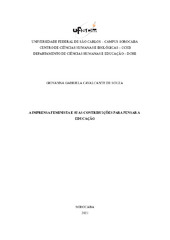| dc.contributor.author | Souza, Giovanna Gabriela Cavalcante de. | |
| dc.date.accessioned | 2022-05-23T11:20:50Z | |
| dc.date.available | 2022-05-23T11:20:50Z | |
| dc.date.issued | 2021-12-03 | |
| dc.identifier.citation | SOUZA, Giovanna Gabriela Cavalcante de.. A imprensa feminista e suas contribuições para pensar a educação. 2021. Trabalho de Conclusão de Curso (Graduação em Pedagogia) – Universidade Federal de São Carlos, Sorocaba, 2021. Disponível em: https://repositorio.ufscar.br/handle/ufscar/16164. | * |
| dc.identifier.uri | https://repositorio.ufscar.br/handle/ufscar/16164 | |
| dc.description.abstract | This study aims to analyze the use of feminist graphic humor present in Ciça’s comic strips
published and released in feminist newspapers "Brasil Mulher", "Nós Mulheres" and
"Mulherio" between 1975 and 1987, during a civil and military dictatorship in addition to the
emergence of feminist movements in their second wave. Through cartoons and comic strips -
understood as discourses - that integrate these periodicals, I try to understand how humor
with a feminist perspective can be understood and used for the education of women, who
since its beginning - thinking of colony Brazil - was authoritarian and practically
inaccessible. Throughout this work, I try to identify, through the description and analysis of
the graphic humor present in daily life of the character “Bia Sabiá”, indications that
demonstrate the potential of the feminist media as an instrument of education for women to
become aware of their human condition in a patriarchal society. The research, in its
methodological organization, is of a qualitative, bibliographic and documentary nature. It is
worth mentioning that, using humor and laughter, the present newspapers are characterized
by a particular approach, by the context in which they were published and, especially, in the
treatment of cultural, social, political and economic elements, as well as the understanding
public and private policy. | eng |
| dc.description.sponsorship | Não recebi financiamento | por |
| dc.language.iso | por | por |
| dc.publisher | Universidade Federal de São Carlos | por |
| dc.rights | Attribution-NonCommercial-NoDerivs 3.0 Brazil | * |
| dc.rights.uri | http://creativecommons.org/licenses/by-nc-nd/3.0/br/ | * |
| dc.subject | Mídia | por |
| dc.subject | Educação | por |
| dc.subject | Feminismo | por |
| dc.subject | Periódicos Feministas | por |
| dc.subject | Educação Feminina | por |
| dc.subject | Media | por |
| dc.subject | Education | eng |
| dc.subject | Feminism | eng |
| dc.subject | Feminist Newspapers | eng |
| dc.subject | Education for Women | por |
| dc.title | A imprensa feminista e suas contribuições para pensar a educação | por |
| dc.title.alternative | The feminist press and its contributions to think education | eng |
| dc.type | TCC | por |
| dc.contributor.advisor1 | Silva, Vanda Aparecida da. | |
| dc.contributor.advisor1Lattes | http://lattes.cnpq.br/9920701759600807 | por |
| dc.description.resumo | O presente trabalho tem como objetivo analisar o uso do humor gráfico feminista presente
nas tirinhas de Ciça publicadas e divulgadas nos periódicos também feministas “Brasil
Mulher”, “Nós Mulheres” e “Mulherio” entre os anos de 1975 e 1987, no contexto de uma
ditatura civil e militar além da emergência dos movimentos feministas em sua segunda onda.
A partir de charges e tirinhas – entendidas como discursos – que integram esses periódicos,
procuro compreender de que modo o humor com uma perspectiva feminista pode ser
compreendido e utilizado para a educação de mulheres, que desde seu início - pensando no
Brasil colônia - foi autoritário e praticamente inacessível. Ao longo deste trabalho, procuro
identificar, através da descrição e análise do humor gráfico presente no cotidiano da
personagem “Bia Sabiá”, indícios que demonstrem a potencialidade da mídia feminista como
instrumento de educação às mulheres para a tomada de consciência de sua condição humana
em uma sociedade patriarcal. A pesquisa, em sua organização metodológica, é de cunho
qualitativo, bibliográfico e documental. Vale ressaltar que, utilizando-se do humor e do riso,
os periódicos presentes caracterizam-se por uma abordagem particular pelo contexto em que
foram publicados e, especialmente, no tratamento de elementos culturais, sociais, políticos e
econômicos, assim como a compreensão política dos domínios público e privado. | por |
| dc.publisher.initials | UFSCar | por |
| dc.subject.cnpq | CIENCIAS HUMANAS::EDUCACAO | por |
| dc.publisher.address | Câmpus Sorocaba | por |
| dc.contributor.authorlattes | http://lattes.cnpq.br/7325729690862099 | por |
| dc.publisher.course | Pedagogia - PedL-So | por |

